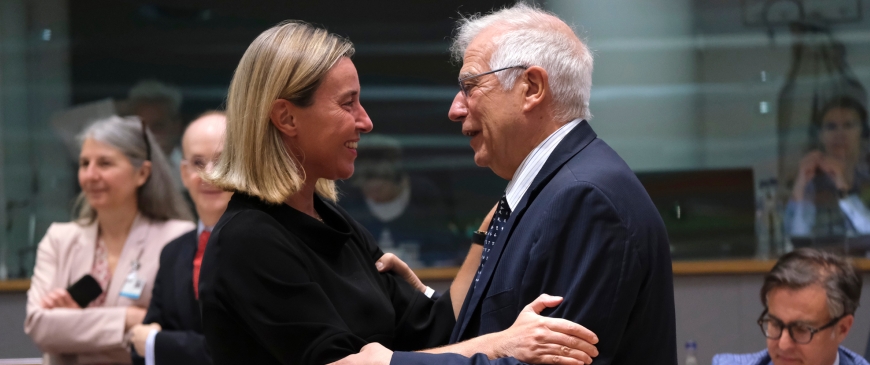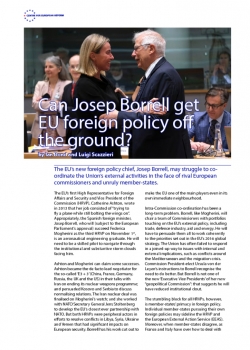
Can Josep Borrell get EU foreign policy off the ground?
The EU’s new foreign policy chief, Josep Borrell, may struggle to co-ordinate the Union’s external activities in the face of rival European commissioners and unruly member-states.
The EU’s first High Representative for Foreign Affairs and Security and Vice President of the Commission (HRVP), Catherine Ashton, wrote in 2013 that her job consisted of “trying to fly a plane while still bolting the wings on”. Appropriately, the Spanish foreign minister, Josep Borrell, who will (subject to the European Parliament’s approval) succeed Federica Mogherini as the third HRVP on November 1st, is an aeronautical engineering graduate. He will need to be a skilled pilot to navigate through the institutional and substantive storm clouds facing him.
Ashton and Mogherini can claim some successes. Ashton became the de facto lead negotiator for the so-called ‘E3 + 3’ (China, France, Germany, Russia, the UK and the US) in their talks with Iran on ending its nuclear weapons programme; and persuaded Kosovo and Serbia to discuss normalising relations. The Iran nuclear deal was finalised on Mogherini’s watch; and she worked with NATO Secretary General Jens Stoltenberg to develop the EU’s closest ever partnership with NATO. But both HRVPs were peripheral actors in efforts to resolve conflicts in Libya, Syria, Ukraine and Yemen that had significant impacts on European security. Borrell has his work cut out to make the EU one of the main players even in its own immediate neighbourhood.
The EU’s new foreign policy chief, Josep Borrell, has an aeronautical engineering degree. He will need to be a skilled pilot to get through the storm clouds ahead.
Intra-Commission co-ordination has been a long-term problem. Borrell, like Mogherini, will chair a team of Commissioners with portfolios touching on the EU’s external policy, including trade, defence industry, aid and energy. He will have to persuade them all to work coherently to the priorities set out in the EU’s 2016 global strategy. The Union has often failed to respond in a joined-up way to issues with internal and external implications, such as conflicts around the Mediterranean and the migration crisis. Commission President-elect Ursula von der Leyen’s instructions to Borrell recognise the need to do better. But Borrell is not one of the new ‘Executive Vice Presidents’ of her new “geopolitical Commission”: that suggests he will have reduced institutional clout.
The stumbling block for all HRVPs, however, is member-states’ primacy in foreign policy. Individual member-states pursuing their own foreign policies may sideline the HRVP and the European External Action Service (EEAS). Moreover, when member-states disagree, as France and Italy have over how to deal with Libya’s civil war, the EU is paralysed. Von der Leyen has encouraged Borrell to follow up proposals by the current Commission to take some decisions by qualified majority, as foreseen in the Treaty on European Union, rather than unanimously, but member-states will resist.
Borrell will need sharp elbows to get to the negotiating table whenever there is an international conflict to resolve. He will also have to show, as Ashton did during the Iran negotiations, that he can offer something as the representative of the EU as a whole that individual member-states cannot. Depending on the state of post-Brexit relations with the UK, he may have to deal with a London more interested in showing off its independence than supporting EU foreign policy initiatives.
If Borrell can see off attacks on his position and reinforce the institutional role of the HRVP, he can then turn to the difficult foreign policy dossiers that he will inherit. His two top, and interlinked, priorities should be the EU’s relations with the US and with China.
Borrell must persuade other Commissioners to work to the priorities in the EU’s 2016 global strategy, but the fact that he is not one of the new ‘Executive Vice Presidents’ of the Commission suggests he will have reduced institutional clout.
Borrell must try to work with President Donald Trump’s administration, however difficult that may be. Not all of the world’s problems can be solved by EU-US co-operation, but very few can be solved without it. Borrell needs to get the two sides talking about the issues they disagree on, including Iran, the Middle East peace process and European defence co-operation. Borrell should also try hard to find areas of shared interest in which the EU and the US could pursue complementary policies.
China is the most important area of potential co-operation. Europeans used to take a more benign view of China’s trajectory than the US, but in recent years the EU too has become disillusioned with an internally repressive and externally assertive China. In March 2019 the Commission and EEAS described China as a “systemic rival promoting alternative models of governance”. Borrell should have a key role in ensuring that the EU presents a united front and defends its values against Chinese divide-and-rule tactics and ‘sharp power’, without involving itself in US-China great power competition.
Apart from relations with the US and China, Borrell should focus on problems closer to home. The EU’s dealings with Moscow cannot be fully normalised as long as Russia occupies Ukrainian territory. However, the EU consensus on taking a firm line with Russia, which has held since the annexation of Crimea in 2014, is increasingly strained, not least by a French effort to ‘reset’ relations. Borrell must counter any preconception that he will be soft on Russia. He should refocus the EU around a compromise policy firm enough to satisfy hawks but flexible enough to keep others on board. At the same time, he must work with the commissioner for the neighbourhood and enlargement, to ensure that the reform process in Ukraine continues.
Borrell will also face a range of pressing challenges in the Middle East. The nuclear agreement with Iran is unravelling, thanks to Trump’s policy of ‘maximum pressure’, and military tension between the US and Iran is increasing, potentially leading to major disruption of oil production and shipping in the Gulf. Borrell will need to redouble European efforts to preserve what is left of the nuclear deal, while persuading Washington and Tehran to de-escalate.
To Europe’s south, Libya remains locked in civil war. Borrell should not simply view Libya through the lens of migration, but instead back a recently announced German initiative to hold a conference to stabilise the country. Improving relations between Rome and Paris, following the change in Italy’s government, give Borrell a chance to forge a common European stance. Libya also offers a rare opportunity for Europe to work together with Trump.
Turbulence in international relations has worsened since Ashton became HRVP in 2009. Borrell must quickly show his 27 passengers that he is the right man to fly them to safety, and dissuade them from hijacking the plane.
Finally, the EU’s ties with Turkey are badly strained. But with the US-Turkish relationship in even worse condition after a series of bilateral spats, it is in the EU’s interest for Borrell to engineer a better relationship with Ankara to prevent Turkey drifting further toward Russia.
If the member-states and the Commission want the EU to have a coherent and effective external policy – and they should, in their own interests – then they must strengthen Borrell, not undermine him. Von der Leyen should make him an executive vice president of the Commission, and member-states should pursue their foreign policy priorities through him. Turbulence in international relations has worsened since Ashton became HRVP in 2009. The need for the EU to have a unified external policy that works should be clear by now. Borrell must quickly show his 27 fractious and sceptical passengers that he is the right man to fly them to safety, and dissuade them from hijacking the plane.
Ian Bond, Director of foreign policy, Centre for European Reform
Luigi Scazzieri, Research fellow, Centre for European Reform

